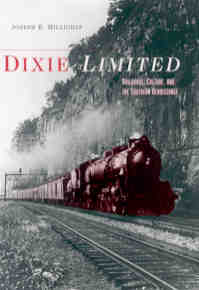Dixie Limited
|
By Joseph R. Millichap University of Kentucky Press |
An
ambitious study, which ranges across issues of traditional and modern
culture, the relationships of African Americans and white writers in the
South, and post-southernism. Millichap effectively portrays the ambivalent
and conflicted relationships of technology and literature [and] broadens our
understanding of the Southern Renaissance by including many previously
marginalized non-canonical figures, especially women and African Americans,
as now central to the phenomenon.
Charles Reagan Wilson, Director, Center for the Study of Southern Culture
In the South, railroads have two meanings: they are an economic force that can sustain a town and they are a metaphor for the process of southern industrialization. Recognizing this duality, Joseph Millichap's Dixie Limited is a detailed reading of the complex and often ambivalent relationships among technology, culture, and literature that railroads represent in selected writers and works of the Southern Renaissance.
Tackling such Southern Renaissance giants as Thomas Wolfe, Eudora Welty, Robert Penn Warren, and William Faulkner, Millichap mingles traditional American and Southern studiesóin their emphases on literary appreciation and evaluation in terms of national and regional concernsówith contemporary cultural meaning in terms of gender, race, and class. Millichap juxtaposes Faulkner's semi-autobiographical families with Wolfe's fiction, which represents changing attitudes toward the ìSouthern Other. Faulkner's later fiction is compared to that of Warren, Welty, and Ellison, and Warren's later poetry moves toward the contemporary post-Southernism of Dave Smith. These disparate examples suggest the subject of the final chapteróthe continuing search for post-Southern patterns of persistence and change that reiterate, reject, and perhaps reconfigure the Southern Renaissance.
It is appropriate, as we enter the twenty-first century, that we recall how much the twentieth-century South was shaped by railroads built in the nineteenth century. It is also important that we recognize how much our future will be determined by the technological and cultural tracks we lay.
Joseph R. Millichap, professor of English at Western Kentucky University, is the author of four books, including Robert Penn Warren, and many essays and articles.
